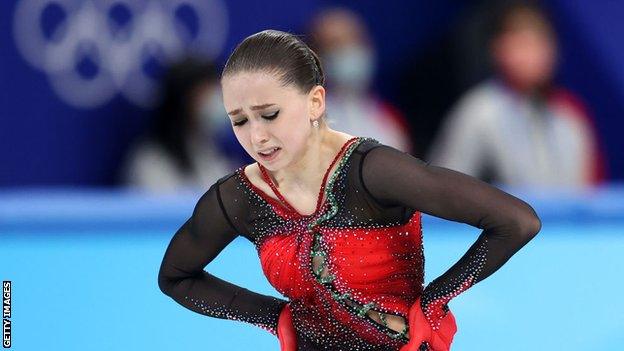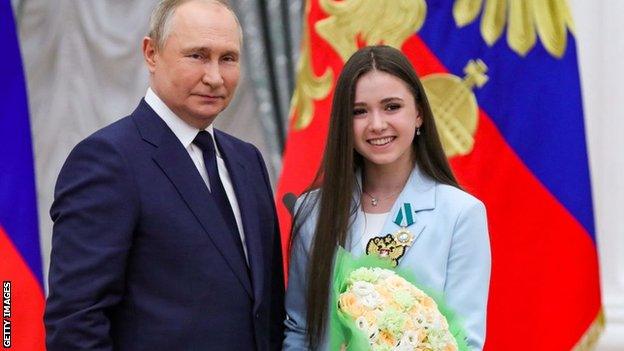Kamila Valieva: What is latest on Olympic figure skating doping scandal?
- Published

Kamila Valieva's 2022 Winter Olympics ended in tears after she missed out on the podium after days of being embroiled in a doping scadal
Russian figure skater Kamila Valieva ends her new routine by covering her head with a black hood.
For the previous four minutes, she has been performing an interpretation of her experience from this year's Winter Olympics, where events around her failed drugs test as a 15-year-old shocked the world.
She removes the covering to soak up the cheers, while dozens of soft toys and flowers are thrown on to the ice by her fans.
Off the ice a few weeks later, she now finds herself under another a metaphorical hood.
The Russian Anti-Doping Agency (Rusada) - which did not name Valieva directly - said on Friday it would not be publicly revealing its decision in the case to "protect the interests" of a figure skater who is a "protected person".
That provoked strong words from US Anti-Doping Agency (Usada) chief executive Travis Tygart, who said that "keeping the decision and facts secret makes a mockery of the whole process".
He called for global bodies such as the International Olympic Committee (IOC), World Anti-Doping Agency (Wada) and International Skating Union (ISU) to immediately announce an appeal against any decision.
It also prompted questions over what will happen about the medals for the Olympic figure skating team event, which have still to be presented eight months after the competition.
Valieva helped the Russian Olympic Committee to victory in team event - but before the medal ceremony took place, news of her failed test was revealed. The IOC took the unprecedented step of delaying awarding medals until the matter had been resolved.
The new international figure skating season starts this weekend with no sign of the darkest cloud of the previous one lifting.
How did we get here - and what might happen next?
Drama in Beijing - not a film yet, but already a skating routine
Valieva had arrived in Beijing in February hotly tipped for gold, having set several world record scores in less than six months since her senior debut and with a European title to her name.
She made global headlines by becoming the first female skater to land a quadruple jump at a Games, dazzling the judges with her highly technical but also aesthetically beautiful routines as she helped the Russian Olympic Committee to victory in the team event.
But before anyone got a team medal around their necks, everything changed. One of the Olympics' biggest-ever scandals erupted when it was revealed she had tested positive for the banned angina drug trimetazidine from a sample taken six weeks before the Games.
Not only was this being announced on the world's biggest stage, it also involved a child.
She appealed successfully against a provisional suspension imposed by Rusada, and the Court of Arbitration for Sport upheld that decision following appeals by the IOC, Wada and ISU, which meant she was allowed to carry on competing in Beijing.
Under intense global media scrutiny and with her entourage also in the spotlight, she took to the ice, fighting back tears at the end of the short programme that put her top of the standings going into the free skate.
Two days later, her skating unravelled and she fell multiple times, leaving the ice in tears - berated rather than comforted by her coach - and sobbing while she awaited the score that meant she finished fourth.
She is now re-living some of those experiences in her 2022-23 routines.
The long programme starts with the words from a CNN report about her from Games: "It was unexpected, it was shocking…" and is set to music from The Truman Show - a film about reality television and a life played out in front of a global audience.
She has not said explicitly what message she is trying to convey with this new routine but is widely quoted in Russian media as saying: "I would like to share this, because this story needs to be lived in order to fully accept it."
Valieva is still working with the same coach, Eteri Tutberidze, who came under scrutiny in Beijing for what International Olympic Committee (IOC) president Thomas Bach called her "chilling" conduct in failing to comfort her tearful charge. Discussing her new routine, the teenager added: "If I did not like the idea [of this programme], I would have said so. The coaches would have listened."
The hood she pulls across at the end is seemingly a reminder of the time she covered her face to walk on her own past reporters, and all their questions, following a training session shortly after the announcement of the failed drugs test.
Her short programme, meanwhile, features her spelling out in Morse code a word she told Russian media that she had "probably missed a little at the Olympics", without explaining what that word is.
Valieva is scheduled to perform at an event in Moscow this weekend - although it is unclear whether any Rusada decisions will affect this.
Medal wait is 'super annoying' as anti-doping process takes time
American Olympic men's champion Nathan Chen, whose team finished second behind the Russians in the team event in Beijing, spoke this week of his frustration of not knowing what was happening.
"That's probably the hardest part, having no knowledge of the situation," he told the Associated Press. "We get updates and it's always, 'We have no idea what's going on.' That's super annoying."
Team-mate and ice dancer Madison Chock added: "It's always on our mind."
Her team silver could be turned into gold, with Japan rising to silver and Canada taking bronze. But Russia may also end up keeping the gold.
The US team launched an unsuccessful legal challenge to try to get the medals awarded during the Games - and at the time, the Americans' lawyers said it could even be as far off as 2024 before they got them.
Canadian former figure skater Meagan Duhamel, reacting to the Rusada statement, tweeted: "This has to be resolved! Enough is enough."
What has Valieva been doing since Beijing and will we see her skate again?

Russian President Vladimir Putin defended Valieva when he gave her an award in April, saying: "Such perfection cannot be achieved dishonestly with the help of additional substances, manipulations"
Less than a week after Valieva left the Beijing ice, Russia invaded Ukraine.
International sports events were relocated away from Russia as part of sanctions against Moscow, and its athletes - already banned from events as a result of state-sponsored doping although able to compete in certain circumstances under a neutral flag - found themselves uninvited from others because of the war.
It means that regardless of where the process is regarding her failed drugs test, Valieva cannot currently compete at the top international events because the International Skating Union has banned Russian and Belarusian athletes from its competitions.
Valieva, who met Russian President Vladimir Putin in April at an event to honour Beijing 2022 medal winners, returned to competition in March at the Channel One Cup - a domestic exhibition event held at the same time as the World Championships were taking place without Russians - and appeared in ice shows over the summer.
She has continued to train with Tutberidze, who is part of the entourage Wada said in Beijing that it would be investigating. There has been no word on the outcome of that process.
In September, Valieva unveiled her new routines for this season, which she is scheduled to showcase in the Russian capital this weekend.
Even if she wears the hood again, there will be no disguising that there is still much to uncover in this case.
Allow X content?
This article contains content provided by X. We ask for your permission before anything is loaded, as they may be using cookies and other technologies. You may want to read X’s cookie policy, external and privacy policy, external before accepting. To view this content choose ‘accept and continue’.